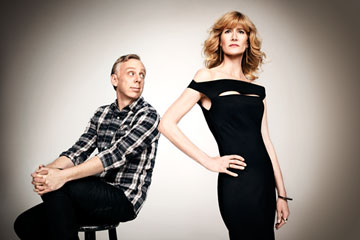
(2 of 2)
To oversimplify Dern and White's creation of Amy, she brought the activism and he brought the therapy. Dern pitched the show to HBO, after she'd acted in the network's 2008 movie Recount, as a comedy about a whistle-blower: "What if Lucy" — as in I Love Lucy — "became Norma Rae?" White, with whom Dern worked on 2007's Year of the Dog, came up with Amy's mental collapse — inspired, naturally, by the TV business. White's screenwriting credits include misfit-centric movies like The Good Girl and School of Rock, but he's had a harder time selling his sensibility to TV. (NBC executives found an episode of Freaks and Geeks he wrote so disturbing, they would not air it.) After Fox quickly canceled his last sitcom, he had a breakdown. (The show's title? Cracking Up.)
White went into therapy, finding himself in the strange position of a comic writer whose sanity had been saved by the most unironic means — "yoga and meditation and Buddha self-help books, all the clichés." So as he wrote Enlightened, he decided it would be too easy to simply make fun of Amy. "It became more earnest," he says, "and it felt like the earnestness of it was actually more fresh."
Fresh and disorienting — it takes a few episodes to figure out exactly how to watch Enlightened, which is neither traditional comedy nor life-and-death drama. There's awkward humor when Amy pratfalls off her cloud of dharma, as when she blissfully shows up to make amends with her ex-boss/ex-lover and ends up wrecking his car in a rage. But then she'll say in voice-over, "I am speaking with my true voice now, without bitterness or fear," and you realize it's not a punch line.
It's also not not a punch line. Enlightened doesn't spoof Amy's quest or valorize it; to wax yogic, it manages to simply be in the moment without judgment. Enlightened is about people trying to fix themselves without totally understanding the repair manual. Sometimes that can be funny, sometimes beautiful.
It's visually beautiful too. A roster of indie-film directors including Nicole Holofcener and Miguel Arteta turn its suburban California setting into a pastel waking dream. It's as if you can feel the camera straining to find the holy in the office parks. Even Amy's workplace feels like a spiritual allegory. The corporate floors, where executives plan layoffs and market products of dubious safety, are decorated with Edenic photographs of greenery and cucumber slices. The basement office to which she's reassigned — literally, cast down — is an antiseptic Siberia. The company's name — Abaddonn Industries, for the biblical place of destruction — is a bit heavy-handed, but the visual message is more complex: that heaven and hell can be the same place.
The meditative, inward-directed first season didn't provide much plot action, something the new season ratchets up. Having hacked a trove of corporate e-mails with Tyler's reluctant help, Amy tries to persuade a reporter (Dermot Mulroney) to expose the company's predatory practices. But the heightened story poses a new set of questions: Why does Amy really want to expose Abaddonn? (For justice? Or just, as she says, because "I'm tired of feeling small"?) Who will she hurt? Is the company evil, or is this just the way this fallen world works?
White says the whistle-blower plot is a way for Amy "to figure out how to create something good in a world that's not necessarily made to support that." Enlightened is unembarrassed to pull up its yoga mat next to you and suggest that even if there are no miracle answers, a person really can grow. And with any luck, maybe her audience will too.
